Methodology Case Study 2022
VerifiedAdded on 2022/09/21
|7
|1495
|22
AI Summary
Contribute Materials
Your contribution can guide someone’s learning journey. Share your
documents today.
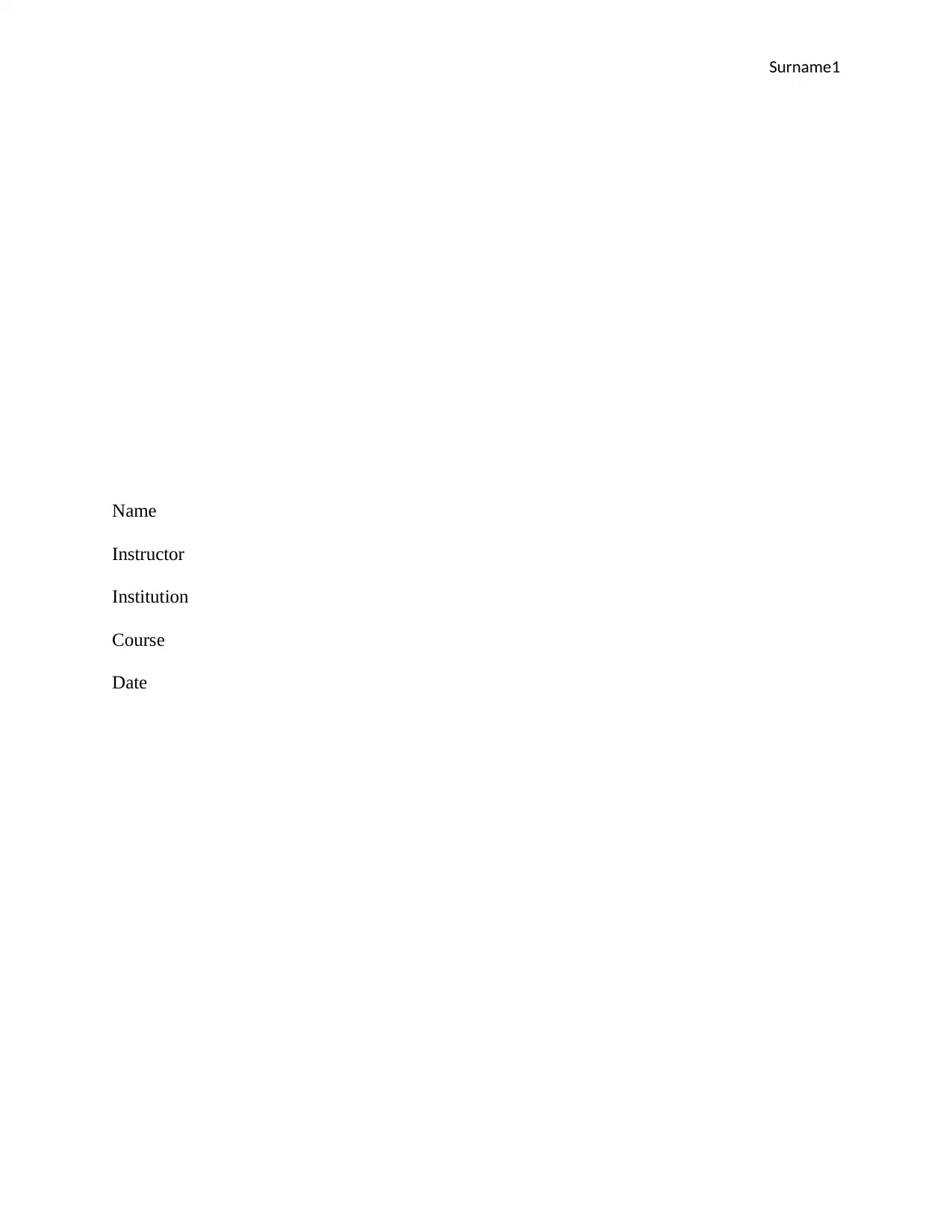
Surname1
Name
Instructor
Institution
Course
Date
Name
Instructor
Institution
Course
Date
Secure Best Marks with AI Grader
Need help grading? Try our AI Grader for instant feedback on your assignments.
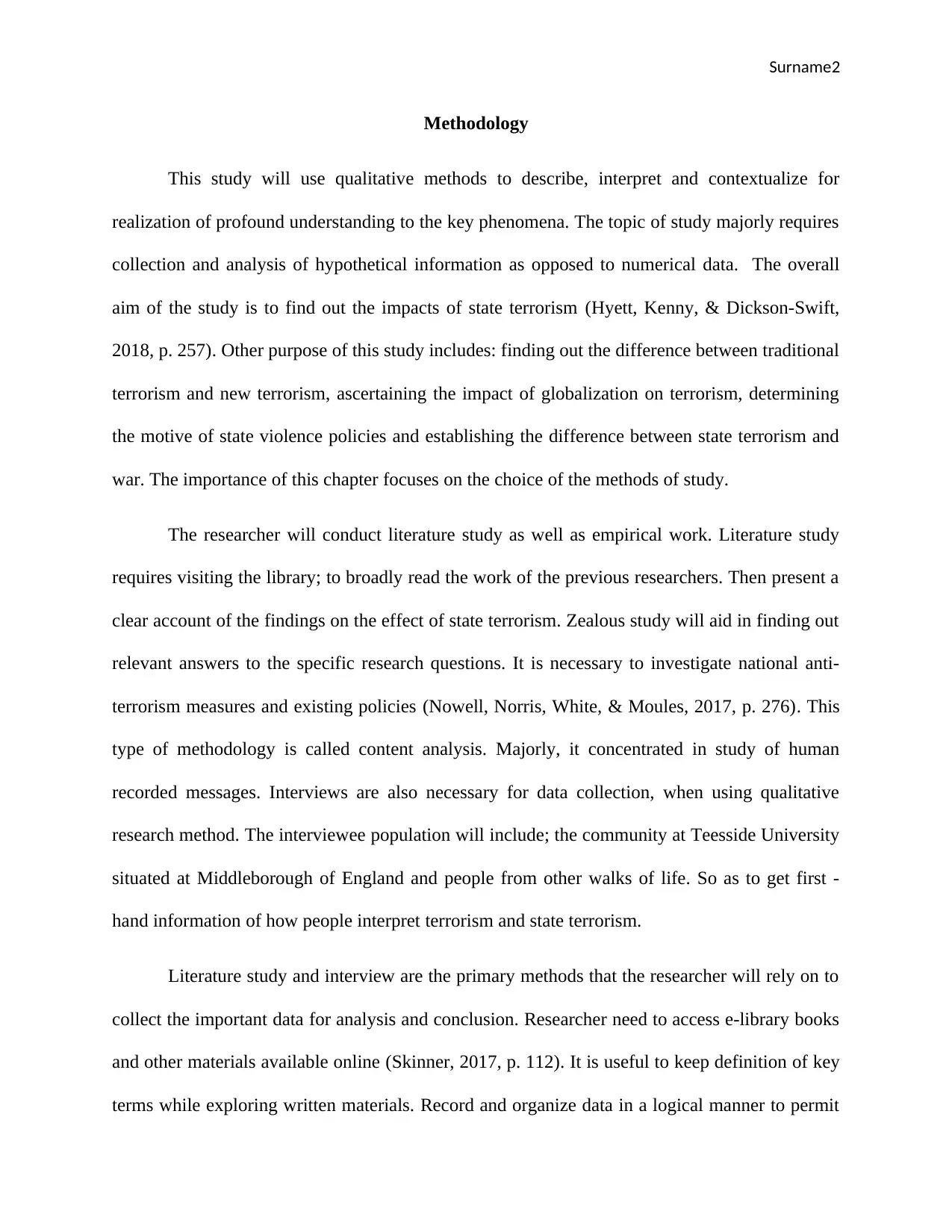
Surname2
Methodology
This study will use qualitative methods to describe, interpret and contextualize for
realization of profound understanding to the key phenomena. The topic of study majorly requires
collection and analysis of hypothetical information as opposed to numerical data. The overall
aim of the study is to find out the impacts of state terrorism (Hyett, Kenny, & Dickson-Swift,
2018, p. 257). Other purpose of this study includes: finding out the difference between traditional
terrorism and new terrorism, ascertaining the impact of globalization on terrorism, determining
the motive of state violence policies and establishing the difference between state terrorism and
war. The importance of this chapter focuses on the choice of the methods of study.
The researcher will conduct literature study as well as empirical work. Literature study
requires visiting the library; to broadly read the work of the previous researchers. Then present a
clear account of the findings on the effect of state terrorism. Zealous study will aid in finding out
relevant answers to the specific research questions. It is necessary to investigate national anti-
terrorism measures and existing policies (Nowell, Norris, White, & Moules, 2017, p. 276). This
type of methodology is called content analysis. Majorly, it concentrated in study of human
recorded messages. Interviews are also necessary for data collection, when using qualitative
research method. The interviewee population will include; the community at Teesside University
situated at Middleborough of England and people from other walks of life. So as to get first -
hand information of how people interpret terrorism and state terrorism.
Literature study and interview are the primary methods that the researcher will rely on to
collect the important data for analysis and conclusion. Researcher need to access e-library books
and other materials available online (Skinner, 2017, p. 112). It is useful to keep definition of key
terms while exploring written materials. Record and organize data in a logical manner to permit
Methodology
This study will use qualitative methods to describe, interpret and contextualize for
realization of profound understanding to the key phenomena. The topic of study majorly requires
collection and analysis of hypothetical information as opposed to numerical data. The overall
aim of the study is to find out the impacts of state terrorism (Hyett, Kenny, & Dickson-Swift,
2018, p. 257). Other purpose of this study includes: finding out the difference between traditional
terrorism and new terrorism, ascertaining the impact of globalization on terrorism, determining
the motive of state violence policies and establishing the difference between state terrorism and
war. The importance of this chapter focuses on the choice of the methods of study.
The researcher will conduct literature study as well as empirical work. Literature study
requires visiting the library; to broadly read the work of the previous researchers. Then present a
clear account of the findings on the effect of state terrorism. Zealous study will aid in finding out
relevant answers to the specific research questions. It is necessary to investigate national anti-
terrorism measures and existing policies (Nowell, Norris, White, & Moules, 2017, p. 276). This
type of methodology is called content analysis. Majorly, it concentrated in study of human
recorded messages. Interviews are also necessary for data collection, when using qualitative
research method. The interviewee population will include; the community at Teesside University
situated at Middleborough of England and people from other walks of life. So as to get first -
hand information of how people interpret terrorism and state terrorism.
Literature study and interview are the primary methods that the researcher will rely on to
collect the important data for analysis and conclusion. Researcher need to access e-library books
and other materials available online (Skinner, 2017, p. 112). It is useful to keep definition of key
terms while exploring written materials. Record and organize data in a logical manner to permit
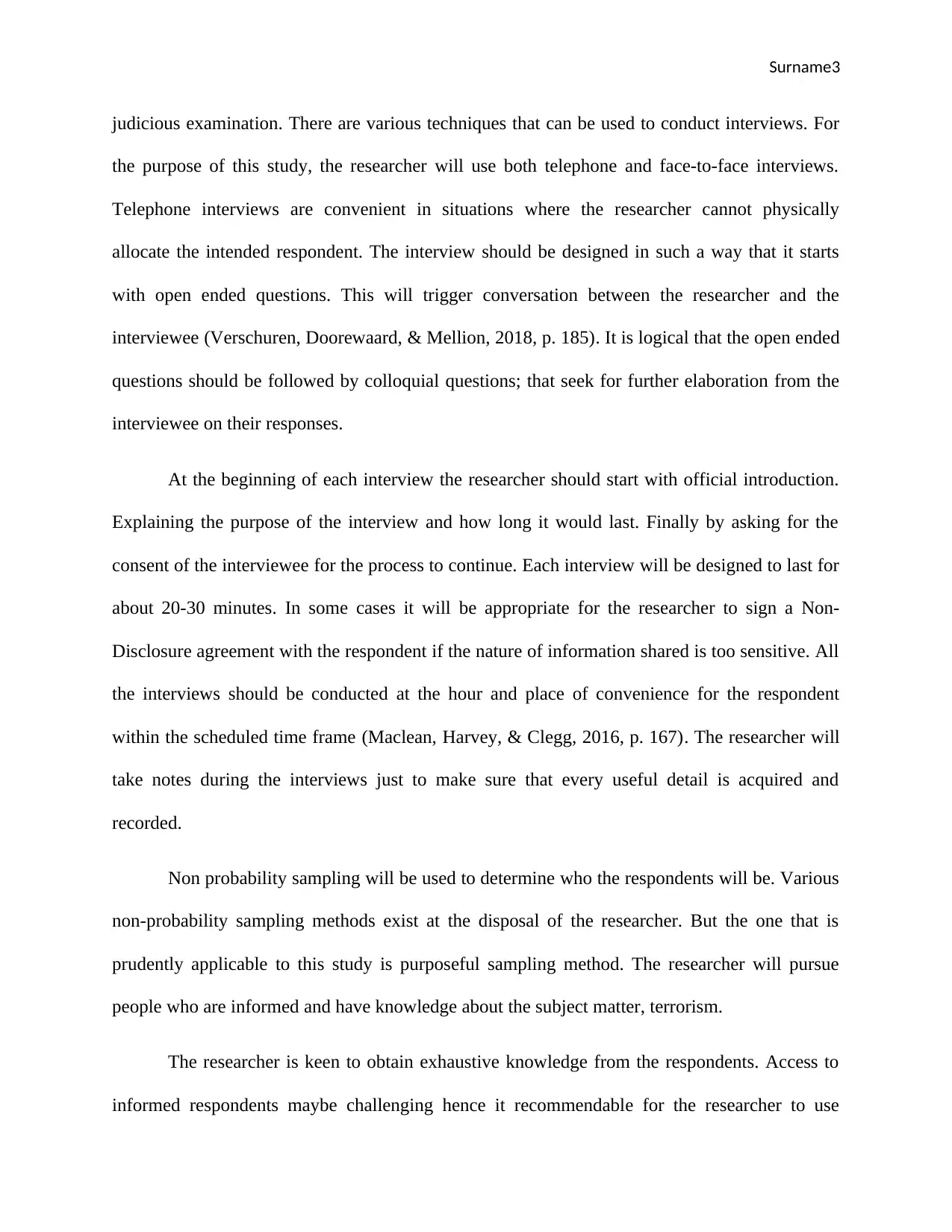
Surname3
judicious examination. There are various techniques that can be used to conduct interviews. For
the purpose of this study, the researcher will use both telephone and face-to-face interviews.
Telephone interviews are convenient in situations where the researcher cannot physically
allocate the intended respondent. The interview should be designed in such a way that it starts
with open ended questions. This will trigger conversation between the researcher and the
interviewee (Verschuren, Doorewaard, & Mellion, 2018, p. 185). It is logical that the open ended
questions should be followed by colloquial questions; that seek for further elaboration from the
interviewee on their responses.
At the beginning of each interview the researcher should start with official introduction.
Explaining the purpose of the interview and how long it would last. Finally by asking for the
consent of the interviewee for the process to continue. Each interview will be designed to last for
about 20-30 minutes. In some cases it will be appropriate for the researcher to sign a Non-
Disclosure agreement with the respondent if the nature of information shared is too sensitive. All
the interviews should be conducted at the hour and place of convenience for the respondent
within the scheduled time frame (Maclean, Harvey, & Clegg, 2016, p. 167). The researcher will
take notes during the interviews just to make sure that every useful detail is acquired and
recorded.
Non probability sampling will be used to determine who the respondents will be. Various
non-probability sampling methods exist at the disposal of the researcher. But the one that is
prudently applicable to this study is purposeful sampling method. The researcher will pursue
people who are informed and have knowledge about the subject matter, terrorism.
The researcher is keen to obtain exhaustive knowledge from the respondents. Access to
informed respondents maybe challenging hence it recommendable for the researcher to use
judicious examination. There are various techniques that can be used to conduct interviews. For
the purpose of this study, the researcher will use both telephone and face-to-face interviews.
Telephone interviews are convenient in situations where the researcher cannot physically
allocate the intended respondent. The interview should be designed in such a way that it starts
with open ended questions. This will trigger conversation between the researcher and the
interviewee (Verschuren, Doorewaard, & Mellion, 2018, p. 185). It is logical that the open ended
questions should be followed by colloquial questions; that seek for further elaboration from the
interviewee on their responses.
At the beginning of each interview the researcher should start with official introduction.
Explaining the purpose of the interview and how long it would last. Finally by asking for the
consent of the interviewee for the process to continue. Each interview will be designed to last for
about 20-30 minutes. In some cases it will be appropriate for the researcher to sign a Non-
Disclosure agreement with the respondent if the nature of information shared is too sensitive. All
the interviews should be conducted at the hour and place of convenience for the respondent
within the scheduled time frame (Maclean, Harvey, & Clegg, 2016, p. 167). The researcher will
take notes during the interviews just to make sure that every useful detail is acquired and
recorded.
Non probability sampling will be used to determine who the respondents will be. Various
non-probability sampling methods exist at the disposal of the researcher. But the one that is
prudently applicable to this study is purposeful sampling method. The researcher will pursue
people who are informed and have knowledge about the subject matter, terrorism.
The researcher is keen to obtain exhaustive knowledge from the respondents. Access to
informed respondents maybe challenging hence it recommendable for the researcher to use
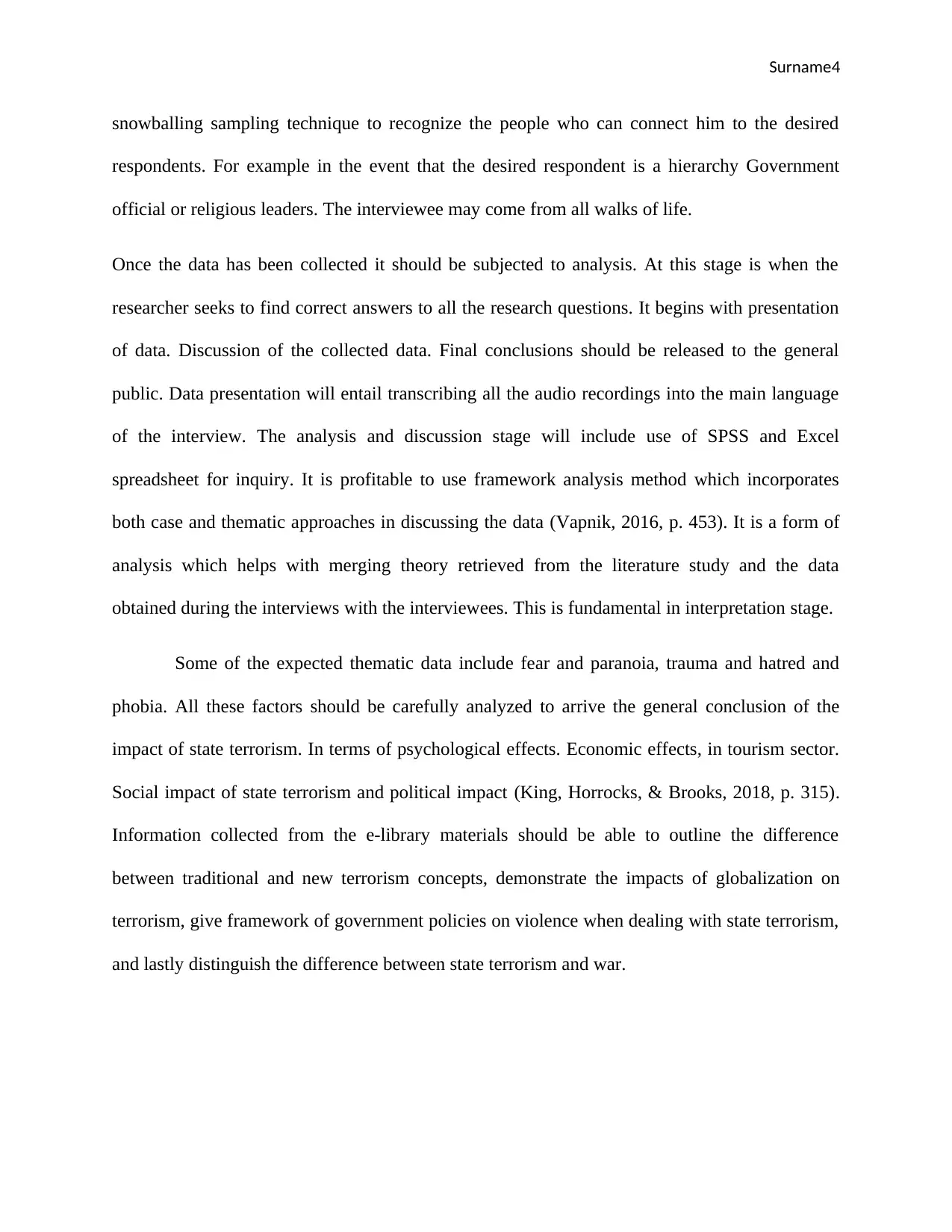
Surname4
snowballing sampling technique to recognize the people who can connect him to the desired
respondents. For example in the event that the desired respondent is a hierarchy Government
official or religious leaders. The interviewee may come from all walks of life.
Once the data has been collected it should be subjected to analysis. At this stage is when the
researcher seeks to find correct answers to all the research questions. It begins with presentation
of data. Discussion of the collected data. Final conclusions should be released to the general
public. Data presentation will entail transcribing all the audio recordings into the main language
of the interview. The analysis and discussion stage will include use of SPSS and Excel
spreadsheet for inquiry. It is profitable to use framework analysis method which incorporates
both case and thematic approaches in discussing the data (Vapnik, 2016, p. 453). It is a form of
analysis which helps with merging theory retrieved from the literature study and the data
obtained during the interviews with the interviewees. This is fundamental in interpretation stage.
Some of the expected thematic data include fear and paranoia, trauma and hatred and
phobia. All these factors should be carefully analyzed to arrive the general conclusion of the
impact of state terrorism. In terms of psychological effects. Economic effects, in tourism sector.
Social impact of state terrorism and political impact (King, Horrocks, & Brooks, 2018, p. 315).
Information collected from the e-library materials should be able to outline the difference
between traditional and new terrorism concepts, demonstrate the impacts of globalization on
terrorism, give framework of government policies on violence when dealing with state terrorism,
and lastly distinguish the difference between state terrorism and war.
snowballing sampling technique to recognize the people who can connect him to the desired
respondents. For example in the event that the desired respondent is a hierarchy Government
official or religious leaders. The interviewee may come from all walks of life.
Once the data has been collected it should be subjected to analysis. At this stage is when the
researcher seeks to find correct answers to all the research questions. It begins with presentation
of data. Discussion of the collected data. Final conclusions should be released to the general
public. Data presentation will entail transcribing all the audio recordings into the main language
of the interview. The analysis and discussion stage will include use of SPSS and Excel
spreadsheet for inquiry. It is profitable to use framework analysis method which incorporates
both case and thematic approaches in discussing the data (Vapnik, 2016, p. 453). It is a form of
analysis which helps with merging theory retrieved from the literature study and the data
obtained during the interviews with the interviewees. This is fundamental in interpretation stage.
Some of the expected thematic data include fear and paranoia, trauma and hatred and
phobia. All these factors should be carefully analyzed to arrive the general conclusion of the
impact of state terrorism. In terms of psychological effects. Economic effects, in tourism sector.
Social impact of state terrorism and political impact (King, Horrocks, & Brooks, 2018, p. 315).
Information collected from the e-library materials should be able to outline the difference
between traditional and new terrorism concepts, demonstrate the impacts of globalization on
terrorism, give framework of government policies on violence when dealing with state terrorism,
and lastly distinguish the difference between state terrorism and war.
Secure Best Marks with AI Grader
Need help grading? Try our AI Grader for instant feedback on your assignments.
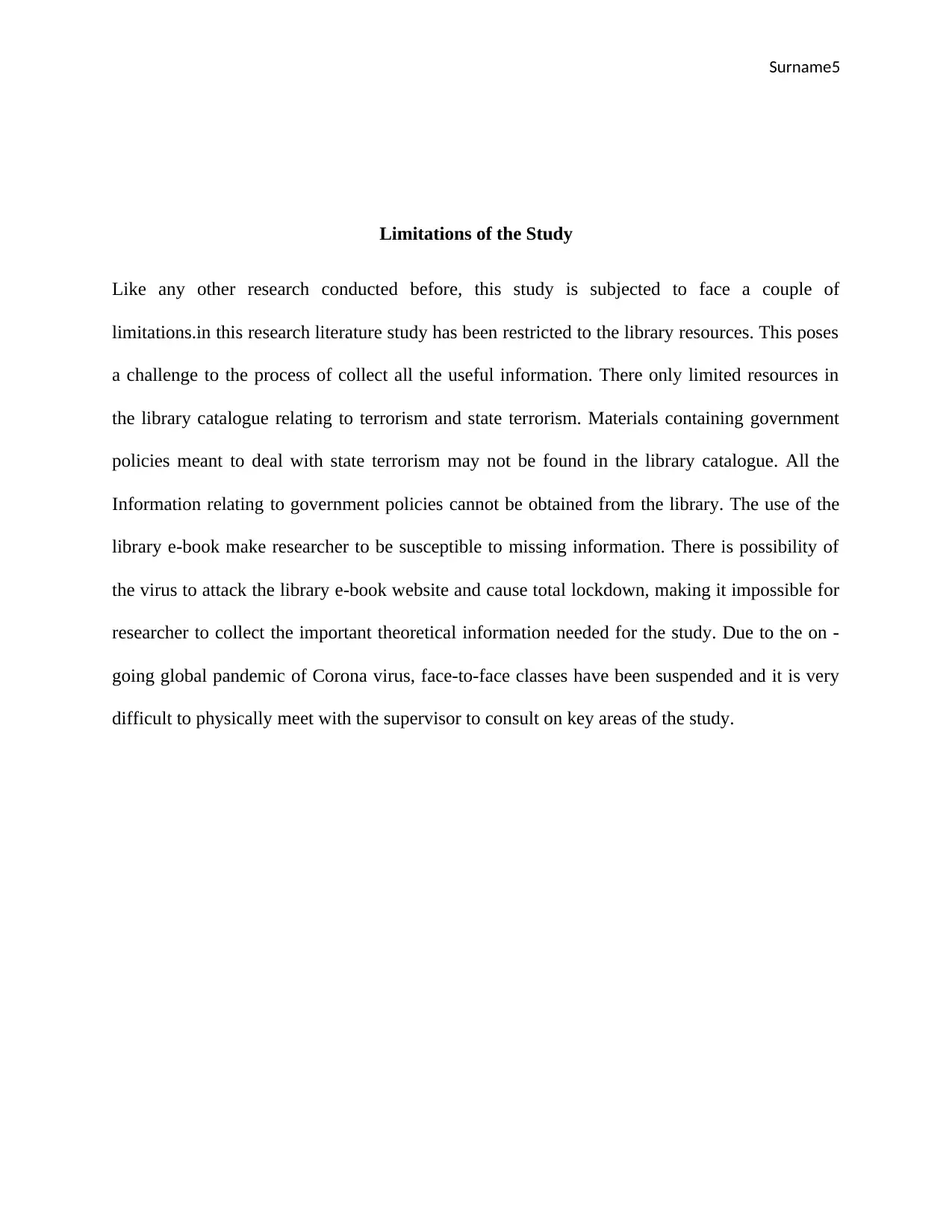
Surname5
Limitations of the Study
Like any other research conducted before, this study is subjected to face a couple of
limitations.in this research literature study has been restricted to the library resources. This poses
a challenge to the process of collect all the useful information. There only limited resources in
the library catalogue relating to terrorism and state terrorism. Materials containing government
policies meant to deal with state terrorism may not be found in the library catalogue. All the
Information relating to government policies cannot be obtained from the library. The use of the
library e-book make researcher to be susceptible to missing information. There is possibility of
the virus to attack the library e-book website and cause total lockdown, making it impossible for
researcher to collect the important theoretical information needed for the study. Due to the on -
going global pandemic of Corona virus, face-to-face classes have been suspended and it is very
difficult to physically meet with the supervisor to consult on key areas of the study.
Limitations of the Study
Like any other research conducted before, this study is subjected to face a couple of
limitations.in this research literature study has been restricted to the library resources. This poses
a challenge to the process of collect all the useful information. There only limited resources in
the library catalogue relating to terrorism and state terrorism. Materials containing government
policies meant to deal with state terrorism may not be found in the library catalogue. All the
Information relating to government policies cannot be obtained from the library. The use of the
library e-book make researcher to be susceptible to missing information. There is possibility of
the virus to attack the library e-book website and cause total lockdown, making it impossible for
researcher to collect the important theoretical information needed for the study. Due to the on -
going global pandemic of Corona virus, face-to-face classes have been suspended and it is very
difficult to physically meet with the supervisor to consult on key areas of the study.
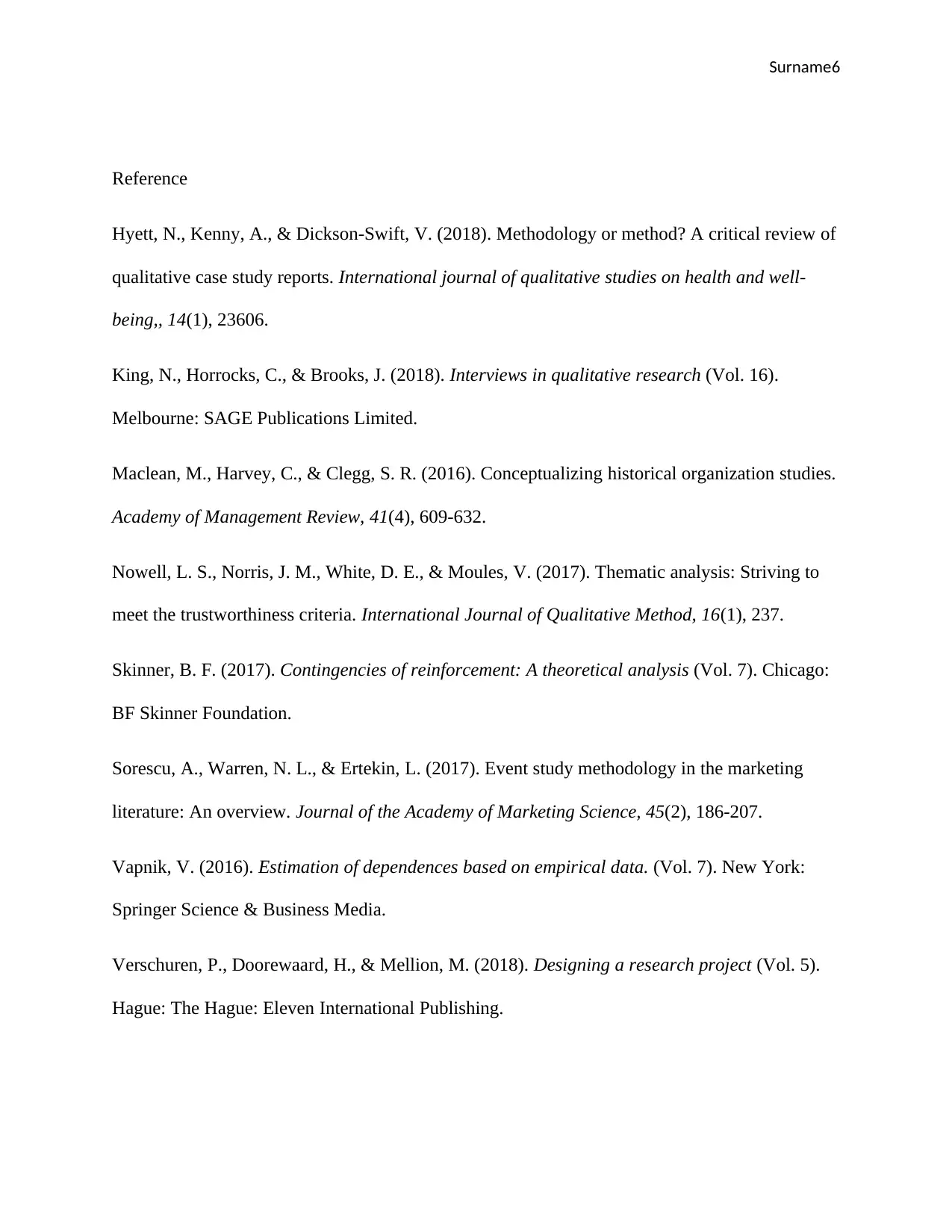
Surname6
Reference
Hyett, N., Kenny, A., & Dickson-Swift, V. (2018). Methodology or method? A critical review of
qualitative case study reports. International journal of qualitative studies on health and well-
being,, 14(1), 23606.
King, N., Horrocks, C., & Brooks, J. (2018). Interviews in qualitative research (Vol. 16).
Melbourne: SAGE Publications Limited.
Maclean, M., Harvey, C., & Clegg, S. R. (2016). Conceptualizing historical organization studies.
Academy of Management Review, 41(4), 609-632.
Nowell, L. S., Norris, J. M., White, D. E., & Moules, V. (2017). Thematic analysis: Striving to
meet the trustworthiness criteria. International Journal of Qualitative Method, 16(1), 237.
Skinner, B. F. (2017). Contingencies of reinforcement: A theoretical analysis (Vol. 7). Chicago:
BF Skinner Foundation.
Sorescu, A., Warren, N. L., & Ertekin, L. (2017). Event study methodology in the marketing
literature: An overview. Journal of the Academy of Marketing Science, 45(2), 186-207.
Vapnik, V. (2016). Estimation of dependences based on empirical data. (Vol. 7). New York:
Springer Science & Business Media.
Verschuren, P., Doorewaard, H., & Mellion, M. (2018). Designing a research project (Vol. 5).
Hague: The Hague: Eleven International Publishing.
Reference
Hyett, N., Kenny, A., & Dickson-Swift, V. (2018). Methodology or method? A critical review of
qualitative case study reports. International journal of qualitative studies on health and well-
being,, 14(1), 23606.
King, N., Horrocks, C., & Brooks, J. (2018). Interviews in qualitative research (Vol. 16).
Melbourne: SAGE Publications Limited.
Maclean, M., Harvey, C., & Clegg, S. R. (2016). Conceptualizing historical organization studies.
Academy of Management Review, 41(4), 609-632.
Nowell, L. S., Norris, J. M., White, D. E., & Moules, V. (2017). Thematic analysis: Striving to
meet the trustworthiness criteria. International Journal of Qualitative Method, 16(1), 237.
Skinner, B. F. (2017). Contingencies of reinforcement: A theoretical analysis (Vol. 7). Chicago:
BF Skinner Foundation.
Sorescu, A., Warren, N. L., & Ertekin, L. (2017). Event study methodology in the marketing
literature: An overview. Journal of the Academy of Marketing Science, 45(2), 186-207.
Vapnik, V. (2016). Estimation of dependences based on empirical data. (Vol. 7). New York:
Springer Science & Business Media.
Verschuren, P., Doorewaard, H., & Mellion, M. (2018). Designing a research project (Vol. 5).
Hague: The Hague: Eleven International Publishing.

Surname7
1 out of 7
Related Documents
Your All-in-One AI-Powered Toolkit for Academic Success.
+13062052269
info@desklib.com
Available 24*7 on WhatsApp / Email
![[object Object]](/_next/static/media/star-bottom.7253800d.svg)
Unlock your academic potential
© 2024 | Zucol Services PVT LTD | All rights reserved.





